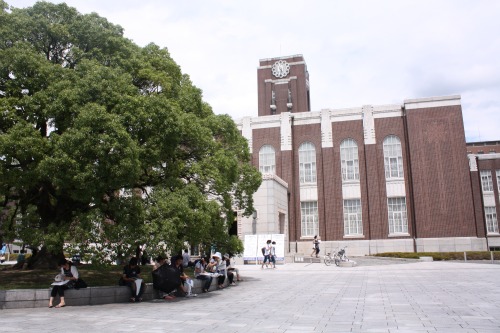- Kyoto University -
<#301 Feature>
Japanese Universities’ Efficient Globalization Drive
- Kyoto University -
By Bak Han-byeol, Student Editor
The Chonnam National University Press and Broadcasting Center (CNUPBC) sent special overseas teams to cover Japanese universities’ efforts to improve their global competitiveness during the last summer vacation. Chonnam Tribune started publishing the results of the overseas coverage serially in its 300th issue. The second part of this special series looks at the present situation of Kyoto University’s globalization efforts. -Ed.-
Chonnam National University (CNU) has been endeavoring to make its students more globally competitive and improve campus globalization by encouraging its students to go abroad and by accepting international students from various countries around the world. International exchange programs for local students and scholarship programs for international students have been increasing. This semester, CNU created the Cultural Diversity Scholarship for international students from non-Asian countries as part of its efforts for campus globalization. However, CNU can still explore new ways toward university globalization by taking lessons from other advanced universities. Second, CNUPBC’s special overseas investigative team visited Kyoto University (KU) in Japan on August 12th to learn about KU’s globalization efforts.
Brief Introduction of Kyoto University
KU was founded by Imperial Ordinance in 1897, as the second university to be established in Japan. KU has ten faculties and 17 Graduate Schools set up across three campus; Yoshida, Uji, Katsura. As of May 1st, 2009, there are 1,430 international students out of total student population of 23,000. They are from 100 different countries around the world. In 2009, KU ranked 25th among world universities according to an evaluation by The Times, a popular British newspaper. It is considered one of the best universities in Japan, along with Tokyo University and has produced several Nobel Prize winners.
Globalization on Undergraduate Education: G30
To achieve strong university globalization, students must be motivated to have a global view and to study overseas. Takami Junko, a director of KU’s Publicity Department, said “To truly develop an international outlook, it is best to go abroad, but Japanese students have a tendency to avoid going abroad to study.” As a result, KU has opted to host international students instead of dispatching Japanese students to other countries. First, KU’s authorities are concentrating on international promotions by using visual methods such as DVDs and a comic book printed in various languages to promote KU to international students. They also initiated special global programs like Global 30 (G30), which has been operating to bring international students to KU’s campus since 2009. Most Japanese universities select international students through the Examination for Japanese University Admission, which focuses on their Japanese ability. However, in KU’s G30 project, international students take classes in English and participate in international academic exchange activities. It gives foreign students that are only fluent in English more opportunities to study at KU in Japan. The G30 project is a great example of effective methods to host international students who have very limited Japanese ability for taking classes. KU is currently aiming to double the number of its international students.

Globalization on Graduate Education: Law School
The CNUPBC special overseas team studied KU’s Law School in order to learn about its globalization drive for Graduate Schools. The KU Law School (KULS) is one of the top five universities in Japan, in the number of students who passed the Japanese New Judicial Examination. The KULS makes an effort to train its students to be lawyers who have global competitiveness by improving its students’ global mind. It has been employing international professors, expanding its exchange programs, and holding numerous symposiums or forums with foreign schools, which has academic ties with the KULS. The school has also promoted globalization with the same methods KU applied to its undergraduate courses, which include increasing the number of classes taught in English. Kanako Takayama, a professor at the Law School said, “There are two short-term international professors now, but we plan to raise students’ global competencies by employing full-time international professors”. KU has an academic exchange agreement with CNU’s Law School. Actually there have been several academic interchanges: in 2005, before the CNU Law School was established, Professors of the Dept. of Law at CNU visited KU to research the Japanese Law School system and then CNU held a symposium on the topic of ”The Present and Future of Japanese Law Schools” with professors from the KULS in 2008.
KU’s Specialization in Globalization Policy
Like all world-class universities, KU realizes the necessity and the importance of globalization in this internationalized age, and is striving to encourage KU’s students to develop a global mind and attitude and to build a global culture on campus as well, mainly by using inbound globalization programs. The university’s globalization efforts were very impressive: For Japanese students who are reluctant to go abroad, KU actively supports them by establishing an effective education environment for globalization. Like KU, CNU needs to devise a new way to be better globalized or modify the present inbound/ outbound globalization programs. KU’s specialized globalization policy can be a good lesson in order that CNU become a world-class university in the near future.
박한별 기자
wan_byul@naver.com

